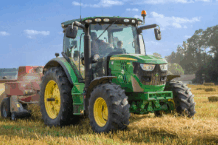Encouraged by the work to manage water use in the Rattlesnake Creek Basin, the United States Fish and Wildlife Service has announced it will withdraw the call for water for the 2024 growing season for the Quivira National Wildlife Refuge.
The call for water would have decimated the local economy surrounding the wildlife refuge, agricultural industry officials say. Kansas Corn Growers Association leaders said the development is encouraging and builds momentum for continued work with local partners such as Groundwater Management District No. 5 and WaterPACK to seek voluntary water conservation efforts to remedy the impairment.
In a letter to the Kansas Department of Agriculture’s Division of Water Resources, the Fish and Wildlife Service thanked DWR for its leadership and acknowledged input and efforts from elected officials and stakeholders. The service asked to withdraw its call for water for 2024, to allow a working group to collaborate on developing options to be implemented in 2025.
Kansas Corn, WaterPACK, GMD5 and other stakeholders have worked closely on this issue to protect agricultural producers on more than 452,000 irrigated acres in the basin.
“This has become a cornerstone issue for the Kansas Corn Growers Association. We are working to protect access to water on nearly half a million irrigated acres in our state. Using our expertise and connections, we were able to help the leadership of GMD 5 to successfully apply for and receive funding for a watershed plan. We also worked closely with Kansas Gov. Laura Kelly who requested expansion of funding for water conservation projects in our state and encouraged the USFWS to allow this process to continue,” Kansas Corn CEO Josh Roe said. “While today’s news is positive, we remain more laser focused than ever to help craft solutions to permanently remedy this situation.”
WaterPACK President Pat Janssen said Kansas Corn and other agriculture groups provided needed assistance.
“Kansas Corn opened doors for the GMD and helped with the process of getting federal support to help farmers in the basin implement conservation efforts that are key to maintaining the economic backbone that irrigated ag provides to our communities and schools.” Janssen said. “We look forward to partnering with Kansas Corn to seek additional funding for water conservation projects that will benefit all water users in the basin.”
Iuka corn grower Kent Moore, who serves on the KCGA board said this recent announcement was the culmination of efforts on the private, local, state, and federal levels.
“These cooperative efforts are leading to meaningful progress in this area and are being recognized by the U.S. Fish and Wildlife Service,” Moore said. “We look forward to continuing to work with the Kelly administration using private, local, state and federal funding to facilitate and implement needed water conservation projects that benefit Kansas farmers, our environment, and our state’s economy.”
Kansas Corn Growers Association leaders look forward to continued participation in this issue, and plan to be active in the working group going forward. The Kansas Corn Growers Association represents its members in legislative and regulatory issues and promotes Kansas corn, the state’s top-producing crop.
As reported in the High Plains Journal



